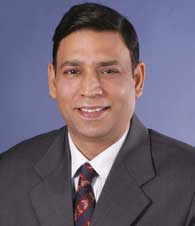|
Executive Interviews: Interview with Anil Bharadwaj on Managing Troubled Times
March 2009
-
By Dr. Nagendra V Chowdary
 Anil Bharadwaj
Anil Bharadwaj Anil Bharadwaj, Secretary General, Federation of Indian, Micro and Small & Medium Enterprises 
Do you think SME sector in India
does not get as good encouragement
and support as it gets in other
countries, including developed
world? Why is it so?
I sincerely believe so. There is too
much political rhetoric and promise
but little action on ground.We have to
go a long away to be an SME friendly
country. In its 2008 ‘Ease of Doing
Business’ (EDB) rankings, the World
Bank ranks India 120th out of 178
countries. We have created a system
of ranks where there is a premium on
being big in at least three respects. In a
May Day speech in 2007 none other
than Manmohan Singh warned that
India’s development had three
features.
|
|
First, many of India’s
spectacular companies were in
sectors where a collusive relationship
between the state and capitalmattered
a great deal. Second, capitalist
development was being driven by a
few large houses, and third, that
small businesses and consumers
weren’t protected enough from effects
of ‘crony capitalism’.
There are around 100 million people
that are coming out of agriculture for
jobs every year. It is sad for a poor
country like ours where there is no
sustainable avenue for job creation
other than by enterprise creation
through industry and commerce. How do you describe the current
economic times in the wake of the US
Financial Crisis. Is it correct to say that the crisis is a derivative of
derivatives (financial)?
That would be too simplistic an
answer. Bust and booms are part and
parcel of capitalism.What started as a
housing bubble got converted into a
full blown crisis because of host of
reasons. I feel the current crisis is
largely a result of institutional
failure—of oversight and regulatory
mechanisms, and political
shortsightedness. The impact has
been exacerbated in era of
globalization as the capital moved
freely across national frontiers.
Warren Buffett’s statement that
“derivatives are weapons of mass
destruction” has to be seen in the
context of prevailing regulatory
mechanismin the US. The removal of
restrictions in 1990s imposed by the
Glass-Steagall Act – which had
prohibited separated commercial
banking and capitalmarkets activities,
created fertile ground for the disaster
to take root in the first place. Derivatives are important financial
innovation and will survive this
crisis, albeit theywill be under greater
scrutiny! What lessons should countries,
companies and individuals draw
from this unprecedented crisis? Is it
correct to say that this is a Great
Depression II?
No doubt that crisis holds important
lessons for all of us. The first lesson is
that market economies require strong
regulatory oversight on a sustained
basis. The second lesson is that any
market mechanism with risk and
reward imbalance is unsustainable.
As Rajan Raghuram had warned
years back, incentives were horribly
skewed in the financial sector, with
workers reaping rich rewards for
making money, but being only lightly
penalized for losses. Thirdly, while
correcting the mistakes we need to
avoid a regulatory backlash (akin to
what happened during Great
Depression) as tendencies to raise
protectionist barriers and overregulate the financial markets are
rising. If countries overdo the
regulation and ring protectionist
jingoism, the financial crisis which
started in the US and later spread in
to EU and Japan affecting all
countries, could well turn into the
most severe economic crisis equaling
or even surpassing the Great
Depression. There is a need for taking
a more nuanced and pragmatic
approach. How do you think Indian economy
is affected by the US Financial Crisis?
Specifically, which industries do you
think are effected more?
There is consensus now that much of
economic growth in the world since
1990s was the result of excess
liquidity which largely became
available due to lax regulation and
massive use of new financial
instruments like derivatives, credit
SWAPS, CDOs etc. Trillions of
dollars were freed from banking
systems to find way into the markets.
India was one of major beneficiary
countries of these global financial
developments attracting huge
portfolio investments, FDIs and
Venture Capital. Besides giving a fillip
to exports as demand grew around
the world and our export capabilities
enhanced for higher value-added
products such as automobile and
petro products, this was particularly
reflected in rising sectors housing,
white goods and auto in domestic
market. Growth in these sectors was
largely driven by hugely unmet
demands of young nation thriving on
demographic dividend leveraged by
easily accessible finance through
EMIs.
1.
Troubled Times Case Study
2. ICMR
Case Collection
3.
Case Study Volumes
|
